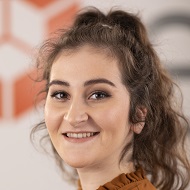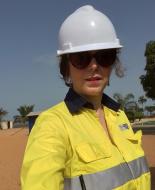Olivia Jackson is a Geoenvironmental Consultant and the controlled waters specialist within the geoenvironmental team for E3P. Within this role, she is responsible for managing projects requiring more specialist risk assessment and project management with respect to controlled waters issues, as well as managing the active remediation of sites being developed by clients. In her role, Olivia reviews and evaluates site investigation reports and previous investigation works carried out at a site in order to produce a full document and data review within the risk assessment reports. This, along with running detailed quantitative risk assessments and hydraulic modelling, give the client and regulators a more robust assessment and characterisation of the site they are developing. These assessments help inform remediation options appraisals and help clarify the main areas of concern on a site that will need careful attention during remediation and enabling works.
The active remediation of sites requires Olivia to ensure that the remediation strategy and geotechnical specifications are being followed by the principal contractor. This is achieved via weekly or biweekly visits to the site, with responsibilities including the excavation of any hotspots or plumes requiring treatment and validation, and making sure there is appropriate testing and compaction of material for up fill earthworks jobs. Olivia notes that the team typically see sites from the site investigation stage all the way through to the build phase, making it possible to really see a site reach its full potential and providing the opportunity to learn about all the stages required to build a residential or commercial development.
Olivia has worked on several challenging projects this year, including a complex former chemical works in north Manchester with outline planning application conditions. This site project helped her to develop her DQRA skills and allowed her to utilise tools such as GWSDAT to model plumes of mobile contamination at the site. The mapping of several contaminants of concern, ensuring an accurate groundwater flow plan was produced and sufficient groundwater and surface water samples were obtained were key contributing factors to the success of this site assessment. Olivia has additionally managed the implementation of a dynamic remediation strategy for a former textile factory in Lancashire. She recalls that the site had inaccessible areas during initial site investigation (SI), so when remediation and enabling works started there were several gaps in the knowledge of the site which needed addressing in order to update the remediation approach required. The original SI identified the presence of multiple contaminants including asbestos, hydrocarbons, semi-volatile organic compounds, dyes within soils, and large volumes of ash. In addition, there was a water course running through the site and challenging topography in the form of slopes and embankments – a real cocktail of issues to deal with. The site proved challenging in terms of both the chemical and geotechnical aspects and so it was imperative that client, regulator, contractor, and consultant worked together to produce a safe and geotechnically sound development platform.
Olivia studied BSc Environmental Science with a Year in Industry (Hons) at Sheffield Hallam University and achieved a first-class honours degree. Her dissertation project surrounded a laboratory-based project on contaminated waters, therefore the job she has ended up in several years later seems quite fitting. During her placement year, she worked for a remediation contractor as a Geoenvironmental Engineer. This role saw her crossing the country in her company van to different sites each day, as well as some long-term resident engineer contracts. During the placement, she learnt about the contracting side of remediation and worked on notable projects for Glasgow City Council, National Grid and Network Rail. Her main role was to monitor the environmental aspects of the projects such as noise, vibration and dust, however this grew into a full time engineer role where she was able to undertake site investigations and manage the contaminated soils side of remediation on the active sites. This year really sparked her interest in contaminated land and the remediation and development of sites.
Olivia started working at E3P in June 2018 as a Graduate Geoenvironmental Consultant after graduating from university where she carried out intrusive site investigations and composed Phase 1 and 2 reports for planning. In April 2019, she became a full Geoenvironmental Consultant and, as she became more proficient in her role, took on more challenging projects and remediation sites. In July 2020, she became the controlled waters specialist for E3P after expressing interest in detailed risk assessment and technical contamination issues.
Olivia is currently working on increasing her CPD hours to support her in achieving Chartered Environmentalist status in the future, as well as working towards the role of Principal Consultant within her company. She joined the IES in 2020 as an Associate member to help her towards her goal of achieving chartership by providing useful and interesting talks, conferences and webinars on topical subjects that are applicable to her work.




